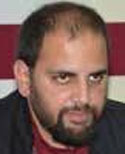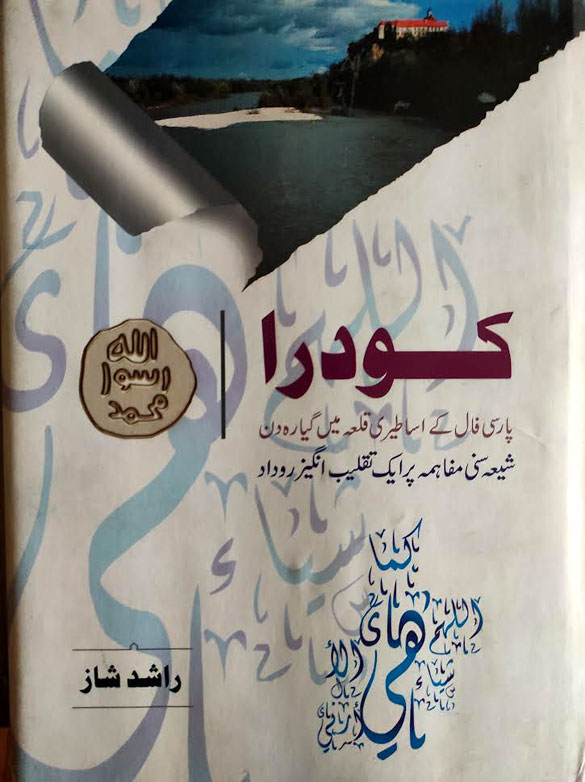Shia-Sunni Sectarianism: Contours And Pragmatic Efforts Need To Be Undertaken To Overcome This Divide

By
Mushtaq Ul Haq Ahmad Sikander, New Age Islam
31 May 2023
Kodra:
Parsi Faal Kye Asatiri Qila Mey Gyara Din Shia Sunni Mufahima Par Ek Taqleeb
Angez Rudaad
Author:
Rashid Shaz
Publisher:
Milli Publications, New Delhi, India
Pages:
239, Pages: Rs 300

------
Rashid Shaz
is an iconoclast. He is tolerated in India because Indian Muslims are a
minority. They have too many pressing issues before them, so they have turned a
blind eye towards his revolutionary writings, that constitute a powder keg
enough to destroy the whole edifice of traditional Rashid Shaz is an
iconoclast. He is tolerated in India because Indian Muslims are a minority.
They have too many pressing issues before them, so they have turned a blind eye
towards his revolutionary writings weltanschauung of looking at Islam, Muslims,
history and sectarianism. Most of the traditional Ulema brush aside his
writings as rantings, and some even have penned down rebuttals against his
views and ideology. However, despite all this opposition, Shaz continues to
write, wielding his pen as a sword that slaughters most of the edifice on which
the traditional and current narratives (Ilm Ul Kalam) of Islam is based. If he
was living in a Muslim majority country in South Asia, he certainly would have
been assassinated, declared apostate or coerced into exile by the opposing
traditional Ulema. Some of his writings have been translated and few published
in English besides other languages, but major corpus of his writings is
available in vernacular Urdu, in which his flowery prose enchants any reader.
Once, enough scholars engage with his writings or if he is able to build of
team of scholars, his writings will certainly create a new discourse among
Muslims.
The tussle
among Sunnis and Shias, that constitute the two sects in Islam, has been going
on for centuries. It has resulted in bloody battles and unending fratricide.
These bloody skirmishes have further been reinforced by the Iran-Saudi Arabia
debacle and dominance for power. The initiation of Arab Spring, that turned
into Arab Winter and ultimately gave birth to the terrorist organization
Islamic State of Iraq and Syria (ISIS), owes its origins to the Sunni-Shia
violence. This book unlike other academic works of Shaz is written as a
travelogue but deals with the issue of Sunni-Shia divide, that has sabotaged every
effort of Muslim unity.
The reader
is made aware of the fact that companions of the holy Prophet Muhammad (pbuh),
Sahaba are being labelled differently by Shias and Sunnis, as these sects hold
reverence for some and demean other and vice versa. There is no consensus about
the uprighteousness of Sahaba among these two sects. It has also led to the
decline of the Muslim Ummah, but the reasons put forth by Shaz are quite
variegated and different from those of the other scholars. We are made aware
about Bosnia and its status in the tussle between versions of Islam promoted
Iran (Shi’ism) and Saudi Arabia (Sunni’ism). Hence, we have many
students, studying in Saudi who later on assume scholarly positions and declare
others as Kafirs and many enrolled in Iran who may not openly say so,
but do presume others as deviated from the straight path. As a result, we have
books that are full of hatred, toxicity and criticism for each other, that does
not let the Shia-Sunni divide be reconciled amicably. So, we have the efforts
of both Imam Khomeini and Alija Izetbegovic failing to bridge this divide.
The reader
is just not made aware about the Shia-Sunni tussle only, as a number of
characters in this travelogue deliberate about various issues. Capitalism, its
perils and the problems Bosnian Muslims are baffling with, along with the
plethora of issues that Muslims in the West are facing including construction
of the new mosques are understood through various prisms and perspectives of
characters. Then there are historical reasons and Prophetic context and how
they have become sacred traditions among Muslims. Now these traditions are
exploited by politicians, religious scholars and spiritual leaders for their
own ends and vested interests.
The sack of
Baghdad at the hands of marauding barbaric Mongol armies, that led to the
drowning and destruction of millions of books, is one of the biggest tragedies
Muslims faced, that had multi-dimensional impact. Earlier and later, the
namesake Caliphs, who in reality were autocratic and monarchical kings were
helpless before any religious interpretation. They only supported the views of
scholars who were quite famous among the masses. Thus, instead of Ijtihad a
certain sectarian view of an individual was passed on as a sacred commandment
of Islam, that resulted in sectarianism. Shias and Sunnis both impose things
over each other, with claims and counter claims about Quran too. This Shia-
Sunni historical tussle is the greatest obstacle that does not let any efforts
of unity to fructify. Muslims do intend and desire to play a productive and
leadership role in the world, but these internal fights sabotage all such
efforts.
In this
travelogue, Shaz also informs the reader about how to get over this internal
strife, by leaving the hangover of Siffin, Neharwan and Karbala battles, that
has divided Muslims, while the history has held Muslims hostage to these
narratives. The battle of Karbala, the hadith books, stories and exaggeration
about all of them has resulted in a permanent divide among the Muslims. So that
needs to be done away with, by deconstructing the Shia-Sunni identity as they
have snapped our relation with the Holy Quran. Shaz states that future maybe
free from Shia-Sunni sectarianism due to unbiased approach and democratization of
knowledge. In future the robots will dominate the scene, that will retrograde
the people towards periphery, as they can perform better than humans. However,
Shaz tries to downplay the severe repercussions that such a future will have
for us all, because technology is not valueless, it has its own narrative and
impacts the human life in diverse manners. Further, will the coming of Robotic
age help this divide to narrow down or become more sharp, like we are
witnessing how the social media is responsible for the growing divisions among
Muslims. The rebuttals and refutations that were earlier confined to few books
and people are now available for mass consumption. The end of this book seems
to be quite abrupt, unlike a travelogue, although it resembles more to a novel,
minus the fiction.
As usual it
is an important addition towards understanding the Shia-Sunni sectarianism, its
contours and pragmatic efforts that need to be undertaken to overcome this
divide. The book hooks the reader to the core and each page is laced with
details that are eye opening. Rashid Shaz, as usual does not bore the reader
and lives to his reputation of being one of the most skilled and best writers
of contemporary Urdu. This book needs to be seriously engaged, debated and
discussed and the merit of the travelogue lies in the fact that it offers food
for thought both to a specialist and general reader. It is always worth to
engage with the writings of Dr Rashid Shaz.
------
M.H.A. Sikander is Writer-Activist based in
Srinagar, Kashmir
URL: https://newageislam.com/books-documents/shia-sunni-sectarianism-pragmatic-divide/d/129896
New Age Islam, Islam Online, Islamic Website, African Muslim News, Arab World News, South Asia News, Indian Muslim News, World Muslim News, Women in Islam, Islamic Feminism, Arab Women, Women In Arab, Islamophobia in America, Muslim Women in West, Islam Women and Feminism
